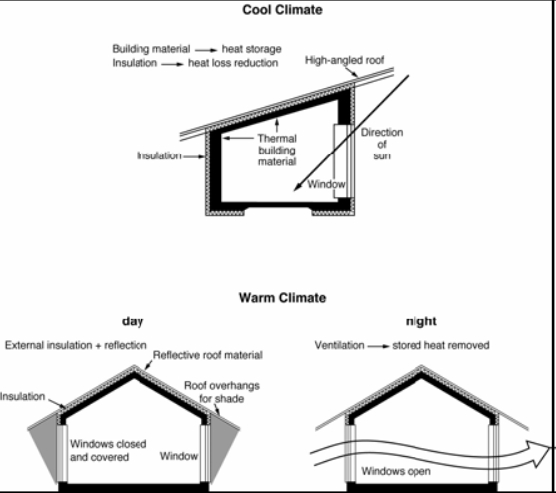
8月4日雅思考试流程图再现,这是今年第二次出现流程图。面对这类题型,同学们且不可慌乱,找好描述的逻辑顺序和链接手段,应对流程图才会比较轻松哦。下面是老师整理的范文,请先参看汉语,了解这样的文章的写作思路。更重要的是在看英语的同时,要重点品味中英文之间的差异,感受英文表达的灵活性。

范文:
这两个流程图展示了不同气候下的房屋设计方案。
These two diagrams show the design of house from different weather: cool and warm respectively
如图所示,在天气寒冷的时候,应该选择角度比较高屋顶以吸收更多的阳光来增加室内温度。与此同时,在房间的内层安置保温材料,用来存贮收集来的热量。并且要在房屋的外侧安装insulation,来减少热量的散失。这样就可以保证尽可能高的室内温度。
As can be seen in the first graph linked to cool climate, roof with a high angle should be adopted to increase the indoor temperature by absorbing more sunshine. Meanwhile, a building material that can store heat is also needed within the house, coupled with the outside insulation, a material that can reduce heat loss. In this way, we can keep as much heat as possible inside the house in cold weather.
而在天气比较热的时候,白天和夜间的处理方式有所不同。屋顶应该采用反射性比较强的材料来避免吸收更多的热量同时屋檐需要延长一部分,获取跟多的阴影部分以确保室内温度降低。外层保温材料仍然需要安装,减少冷空气的流失。在白天注意关闭好窗户并将其遮盖起来,避免更多的阳光进入室内。这样就可以尽最大的可能避免热量进入并且保存冷空气在室内。而到了晚上只需要将窗户打开,让室内空气移出并且容室外的冷空气流入房间,降低室内温度。
In contrast, when it is hot, the designing method is divided into two modes: day and night respectively. In order to lessen more heat intake, a reflective material should be adopted to build the roof, which is overhung for more shade. The insulation is also required to reduce the loss of cold air. What is worth mentioning in the day is that windows must be kept closed and covered, to avoid warm sunshine, while at night the windows should remain open, releasing the stored heat during the daytime and exchanging for more cool air.
总之,不同的气候条件下的房屋设计方案也都会有所不同。
Overall, housing design should differ in cool climates and warm climates.
编辑推荐:
更多内容请关注新东方网雅思频道,也可扫码关注我们的微信公共账号或加QQ群168861834。

(编辑:秦洁)



